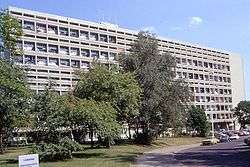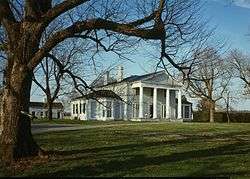
SC Westend 1901
SC Westend 1901 is a German association football club from the city of Berlin. The club's greatest success has been promotion to the tier one Oberliga Berlin in 1950 where it played for two seasons. After the introduction of the Bundesliga in 1963 the club made one more appearance in the second tier, playing in the Regionalliga Berlin in 1973–74.
The club also made a single appearance in the DFB-Pokal, the German Cup, in 1974–75, losing to 5–1 to Eintracht Nordhorn in the first round.
History
While the club traces its origins back to 1901 the current club, SC Westend 1901, was formed in 1933 when Charlottenburger FC 01 Concordia merged with Charlottenburger FC Viktoria to form Charlottenburger FC 1901. In 1945, after the Second World War, Charlottenburger FC became SG Charlottenburg-Nord which temporarily adopted the name SG Westend Berlin from 1946 to 1948. A year after reverting to its former name the club finally became SC Westend 1901 in 1949.
After the frequent name changes in the post-war era, the club finished runners-up in the tier two Amateurliga Berlin in 1950 and thereby earned promotion to the Oberliga Berlin. It played at this level for two seasons, finishing tenth out of 14 clubs but came second-last the season after and was relegated back to the Amateurliga.
Westend
Westend may refer to:
See also

Westend (Berlin)
Westend is a locality of the Berlin borough Charlottenburg-Wilmersdorf. It emerged in the course of Berlin's 2001 administrative reform on the grounds of the former Charlottenburg borough.
Geography
Westend is situated west of Berlin's inner city on Spandauer Berg, the northern peak of the Teltow plateau between the river valleys of Spree and Havel. Originally a mansion colony, it is today a quite densely settled, still affluent territory adjacent to Charlottenburg in the east. It is centered on Theodor-Heuss-Platz, a large square, from where the Heerstraße arterial road runs westwards to the Berlin city limits. In the west and north, Westend borders on the Berlin Spandau borough.
The locality also includes the neighbourhoods of Neu-Westend and Ruhleben, a suburban housing area of the 1920s. The site of the former Ruhleben internment camp, a World War I detention camp for civilians, today is part of the adjacent Spandau district. Furthermore, the areas of Pichelsberg, Heerstraße and Eichkamp at the northern rim of the Grunewald forest belong to Westend. It is home of the Berlin trade fair (where the Internationale Funkausstellung is held) and of the former Reichssportfeld area of the 1936 Summer Olympics.

Westend (Trevilians, Virginia)
Westend is a temple-fronted house near Trevilians, Virginia. Built in 1849, the house's design refers to the Classical Revival style, representing an extension of the Jeffersonian ideal of classical architecture. The house was built for Mrs. Susan Dabney Morris Watson on a property that she had inherited from her late husband. The building project was supervised by Colonel James Magruder. The house was the centerpiece of a substantial plantation, and a number of dependencies, including slave dwellings, survive. Westend remains in the ownership of the descendants of Mrs. Watson.
The two-story house is built of brick, and features a tetrastyle Tuscan portico on its principal facade. The main three-bay section is flanked by three-bay, one-story wings and surmounted by a hipped roof with prominent interior chimneys The fronts of these wings were originally orangeries. The rear facade features a one-story Tuscan porch. The house is painted in a light color to resemble stucco. The interior is arranged around a central hall that is subdivided into an entrance hall and a stair hall to the rear, with two rooms to either side.

